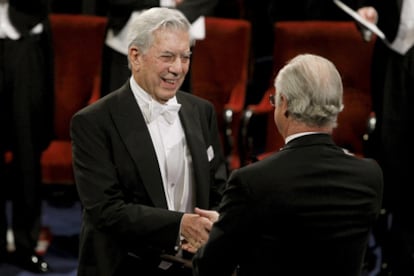Mario Vargas Llosa awarded literature's greatest accolade
Award ceremony ends whirlwind week of tributes and surprises
Spanish culture officials were out in force in Stockholm to watch the Peruvian-Spanish writer Mario Vargas Llosa accept the Nobel Prize in Literature on Friday. As soon as the award had been handed out, Culture Minister Ángeles González-Sinde said: "How beautiful, Spanish was spoken at the ceremony."
It was a special moment for all Vargas Llosa readers when Per Wästberg, president of the Nobel Committee and member of the Swedish Academy, pronounced: "My dear Mario Vargas Llosa, you have encapsulated 20th-century history in a bubble of imagination. It has floated on air for 50 years and shines still. The Swedish Academy congratulates you."
Mario Vargas Llosa's work has been published in over 30 languages, and while the 74-year-old writer had been a strong contender to win this year's Nobel Prize in Literature, his publishers in Swedish, Italian and Spanish all admit that news of his win caught them off guard just as they were signing (or had recently signed) the contract for his new novel, El sueño del celta (or The Celt's dream, for now available only in Spanish).
"You have encapsulated 20th-century history in a bubble of imagination"
"His manuscripts are ready to print; he is an author who helps the publisher"
Neither Norstedts' Eva Gedin and Gunilla Sondell, Einaudi's Ernesto Franco nor Alfaguara's Pilar Reyes would say how much they paid for the rights to the book, but at an encounter to celebrate the author's award, all of them described how excited they were knowing they had a Nobel winner in their ranks. Some of them, like Italy's Einaudi, have been publishing Vargas Llosa's work for the last 30 years, while the Swedish Norstedts has been doing so for over two decades. Alfaguara has been his Spanish-language publisher since 1997, and for now it is in a unique position to say what kind of a sales impact El sueño del celta is having.
Reyes said that Alfaguara has doubled the original print run and distributed half a million copies of the book in Spain and Latin America. In the United States, where they originally put 30,000 copies out on sale, there are now 20,000 more available in bookstores. Meanwhile, his publishers in other languages are rushing to pull Vargas Llosa titles out of their backlist, chiefly the ever-popular The Feast of the Goat, but also The Green House, Conversation in the Cathedral and The Time of the Hero.
Publishing Vargas Llosa, they all agreed this week, is "a marvelous adventure" in the words of Ernesto Franco, who was the Peruvian author's Italian translator before becoming his publisher. Reyes noted that he is "an author who engages in conversation; someone who sends in pristine originals and who even turns in manuscripts as though they were going out to print immediately. He is the kind of author who helps the publisher."
Spaniards know how much Vargas Llosa worries about typos (they literally drive him mad), while Swedes and Italians have noticed how concerned he is with the quality of translations. As a matter of fact, he dropped his original Swedish publisher when he heard how poorly it had translated one of his first novels, The Time of the Hero.
Although the Peruvian-born, Spanish-based Vargas Llosa does not himself have a gift for languages, he has been surrounded all week by a multilingual group of people who are sharing his time of glory- and his hectic agenda- in the run-up to Friday's Nobel award ceremony.
One of his last activities before formally accepting the prize on Friday was an appearance on the popular television program Skavlan, which is watched in Sweden and Norway. Despite a failing voice that evidenced the wear and tear of the last few days, the writer found room for humor when he described a past experience with the Swedish actress Liv Ullmann as "terrifying."
He was referring to his participation as a juror at the Cannes Film Festival the year when the president of the jury was the former Ingmar Bergman muse. The actress, also a guest on the show, opened her eyes wide when she heard this description, which Vargas Llosa hastened to clarify. What he said was that Ullmann imposed such strict rules about the elements that had to be taken into account to evaluate the films, that at some point "the charm of the movies vanished for me" and the author found himself instead focusing on the technical merits of light, special effects, sound and wardrobe.
Asked by the host why he has written so much about dictatorships, Vargas Llosa replied that while Ullmann's "dictatorship" at Cannes was quite bearable, other types of tyranny bother him deeply. This line of thought led him to talk about his father, whom the author met after having thought he was dead for years. His father, he said, put him through a truly terrifying experience, pulling him out of the paradise in which he had been living with his mother for a decade. The experience, he said, no doubt encouraged him to become a writer, and literature became an escape route from parental oppression. Vargas Llosa also briefly mentioned his well-known quarrel with that other major figure of Latin American letters, Gabriel García Márquez, who was once his friend. But the Peruvian refused to reveal anything about the incident and the "black eye" he said he gave Gabo, honoring a mutual agreement to never talk publicly about it.

Tu suscripción se está usando en otro dispositivo
¿Quieres añadir otro usuario a tu suscripción?
Si continúas leyendo en este dispositivo, no se podrá leer en el otro.
FlechaTu suscripción se está usando en otro dispositivo y solo puedes acceder a EL PAÍS desde un dispositivo a la vez.
Si quieres compartir tu cuenta, cambia tu suscripción a la modalidad Premium, así podrás añadir otro usuario. Cada uno accederá con su propia cuenta de email, lo que os permitirá personalizar vuestra experiencia en EL PAÍS.
¿Tienes una suscripción de empresa? Accede aquí para contratar más cuentas.
En el caso de no saber quién está usando tu cuenta, te recomendamos cambiar tu contraseña aquí.
Si decides continuar compartiendo tu cuenta, este mensaje se mostrará en tu dispositivo y en el de la otra persona que está usando tu cuenta de forma indefinida, afectando a tu experiencia de lectura. Puedes consultar aquí los términos y condiciones de la suscripción digital.




























































